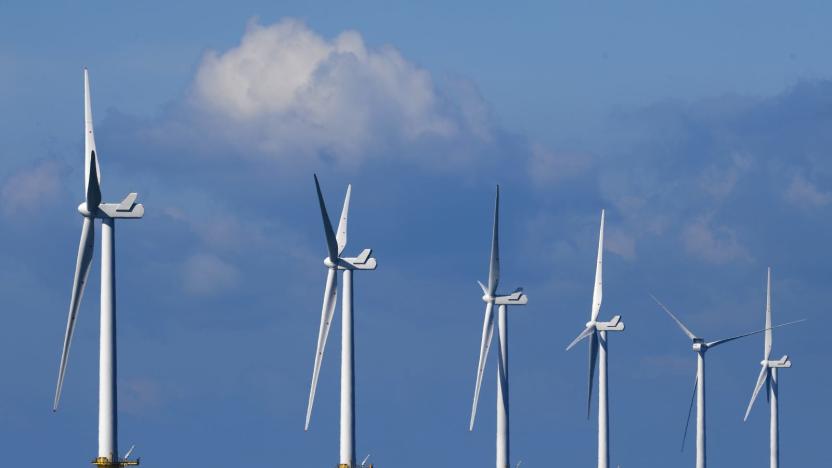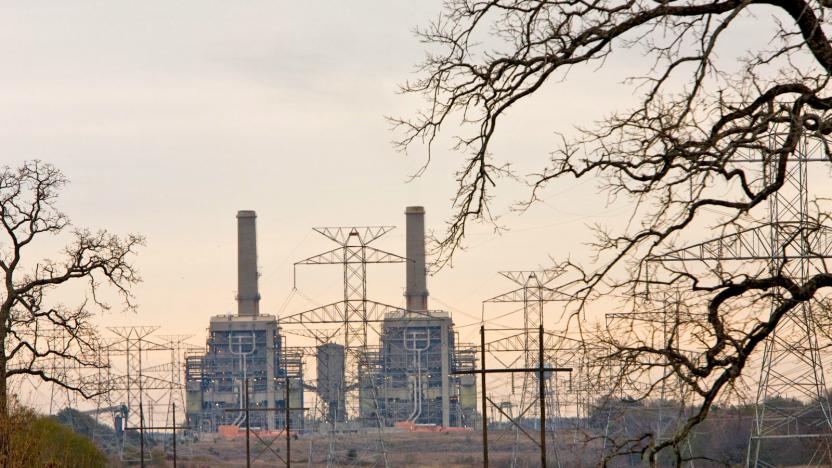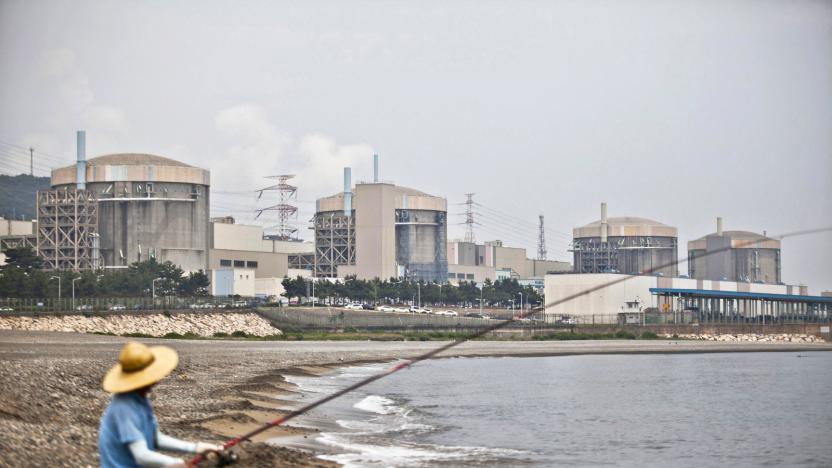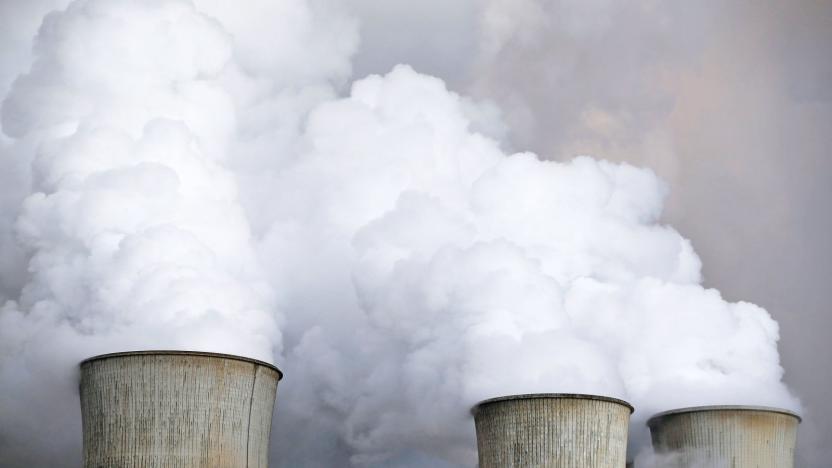fossilfuels
Latest

California lawmakers pass bill to phase out fossil fuels by 2045
Lawmakers in California have strengthened the state's commitment to clean energy by passing a bill to stop using fossil fuels entirely by 2045. The legislature passed S.B. 100 by 43 votes to 32, making California the second state to take such a step, following Hawaii. The bill now moves to a procedural vote in the Senate, and then to Governor Jerry Brown to sign it into law. Around 72 percent of the state's residents were in support of the move, according to polls cited by CBS.

Insurance giant stops covering firms that depend on coal
The elimination of coal power isn't just good for the environment... it's quickly becoming good for the corporate bottom line. Insurance giant Swiss Re has enacted a policy that refuses coverage to any company that either generates 30 percent or more of its revenue from coal power, or uses at least 30 percent coal power to run its operations. Swiss Re touted the move as reflecting its commitment to limiting global warming (it made a pledge in 2015 alongside the Paris climate accord), but it also casts this as a shrewd business move.

Renewable energy outstripped coal use in the UK for most of 2017
The UK has been working to significantly reduce its carbon emissions and with that effort, it hit some major green milestones this year. In April, the country went a full day without coal-generated power for the first time in 135 years. And in June, the country saw more than half of its energy being generated by renewables (i.e. solar, wind, hydropower and biomass) for the first time.

Coal power plant closures ramp up in spite of White House plans
The Trump administration may hope that it can reverse coal power's decline by ending the Clean Power Plan and other eco-friendly efforts, but the industry's moves suggest otherwise. Luminant has announced plans to close three major coal plants in Texas (in Freestone, Milam and Titus counties) between January and February of 2018. The shutdowns will take a combined 4,200MW of power off the grid -- enough to run over 4 million homes, as Reuters notes. The news boosts the expected capacity of 2018 power plant closures to over 13,600MW, or a whopping 79 percent more than the known closures for this year. It's not a record high (nearly 18,000MW went offline in 2015), but it's clear that the trend is toward more closures, not fewer.

China aims for an industry-changing ban on fossil fuel cars
It's not just European countries planning long-term bans on fossil fuel cars. China's vice minister of industry and IT, Xin Guobin, has revealed that the country's government is developing a timetable for a ban on sales of fossil fuel vehicles. The official hasn't given a rough estimate for when a ban would kick in, but France and the UK are both aiming for 2040. It won't be surprising if China aims for a similar time frame, and it's already introducing a cap-and-trade program that forces companies to buy credits from rivals if their fuel economy and emissions don't fall within certain limits.

UK to ban sales of fossil fuel cars by 2040
France isn't the only big country getting ready to ditch fossil fuel vehicles. The UK is planning to ban sales of new fossil fuel-powered vehicles (including vans) from 2040. It's all about improving air quality, the government claims: airborne pollution is the "biggest environmental risk" to public health, and cutting off sales will help tackle pollution quickly. The move is part of a larger, £3 billion ($3.9 billion) strategy that will call on local government to retrofit buses, alter roads and even tweak traffic light patterns in the names of lower emissions and greater efficiency.

South Korea turns its back on coal and nuclear power
South Korea is clearly a tech-savvy country when companies like Samsung and LG dominate, but you almost wouldn't know it by looking at its energy policies. It not only depends heavily on coal and nuclear reactors (70 percent of its power comes from those sources), but gives them tax breaks to keep prices down. However, it's making an about-face now that there's a new president. New leader Moon Jae-in is proposing an energy strategy that would discourage the uses of coal and nuclear in favor of both natural gas and renewable sources like hydro and solar. It would be unusually rapid -- and not without potential problems.

Coal's sharp decline leads to a drop in US energy production
Whether you like it or not, coal power is on the decline... and that's having a marked impact on American energy output. The US Energy Information Administration has published data revealing that the country's 2016 energy production dropped over year-over-year -- the first such drop since 2009. Most of it can be pinned on coal, whose output fell a steep 18 percent compared to 2015. Other energy sources dipped as well, but not by nearly as much. Natural gas and crude oil were down 'just' 2 and 7 percent respectively.

Emails show new EPA chief is cozy with the fossil fuel industry
There's no question that new Environmental Protection Agency leader Scott Pruitt has a conflict of interest when he previously declared himself the agency's number one enemy. However, it's now clearer just why he so fervently opposes eco-friendly regulation. The Center for Media and Democracy has used a court order to obtain emails from Pruitt's time as Oklahoma's attorney general, and they reveal an uncomfortably close relationship with the fossil fuel industry he's now supposed to regulate.

Ireland votes to stop investing public money in fossil fuels
Ireland just took a big step toward cutting coal and oil out of the picture. Its Parliament has passed a bill that stops the country from investing in fossil fuels as part of an €8 billion ($8.6 billion) government fund. The measure still has to clear a review before it becomes law, but it would make Ireland the first nation to completely eliminate public funding for fossil fuel sources. Even countries that have committed to ditching non-renewable energy, like Iceland, can't quite make that claim. The closest is Norway, which ditched some of its investments back in 2015.

Obama uses 1953 law to block Arctic drilling under Trump
President Obama has blocked any attempts at drilling for oil off the U.S. Outer Continental Shelf. This would "indefinitely" stop oil and natural gas extraction in the areas, according to a report by CNBC. And unlike executive orders that've been signed into place over the past eight years, this apparently can't be easily undone by President-elect Trump when he takes office.

Study: we can ditch fossil fuels in 10 years, if we want to
The quest to end the use of fossil fuels might not be as daunting as you think. A University of Sussex study claims that humanity could drop coal and oil within a decade, based largely on historical evidence that many tend to overlook. Professor Benjamin Sovacool notes that energy transitions have happened quickly whenever there was a combination of "strong government intervention" with economic or environmental incentives to switch. It only took 11 years for the Canadian province of Ontario to abandon coal energy, for example, while nuclear power surged to 40 percent of France's electricity supply within 12 years. In the case of fossil fuels, it's a combination of climate change worries, dwindling resources and advanced technology that could step up the pace.

Xprize challenge offers $20 million to curb fossil fuel emissions
Sadly, carbon dioxide emissions aren't going away just yet. However, the Xprize crew would like to at least see those emissions do something besides accelerate climate change. They're launching the NRG COSIA Carbon Xprize, a competition that will hand out a total of $20 million to teams that convert fossil fuels' CO2 output into genuinely useful products. The 4.5-year challenge will be separated into two tracks (one for coal emissions, the other for natural gas), both of which will offer a pool of $2.5 million for hitting initial lab milestones and a $7.5 million grand prize for whoever succeeds in the real world.

Costa Rica hasn't used any fossil fuel in over two months
It's been 75 days since Costa Rica's power grid last had a sip of petroleum. Thanks to heavy rainfall at the start of the year, the Central American nation has been able to provide 100 percent of its energy needs via renewable resources. This certainly represents a major milestone in green energy production but there's no guarantee that other nations will be able to replicate this feat or that Costa Rica's renewable energy scheme is even sustainable.

Inhabitat's Week in Green: i-oniq hybrid, spherical solar cell and an incredible LEGO printer
Each week our friends at Inhabitat recap the week's most interesting green developments and clean tech news for us -- it's the Week in Green. This week epic green transportation initiatives kicked off around the world as Inhabitat reported that Shenzhen, China launched the world's largest electric vehicle fleet and London's brand new Eco-Routemaster hybrid bus hit the streets for the first time. We also showcased an earthquake-proof Japanese building system capable of levitating an entire house, and we brought you sneak peeks at the hottest eco vehicles that will be unveiled at next week's Geneva Motor Show, including Hyundai's sexy i-oniq hybrid and Infiniti's Emerg-E plug-in. Audi also turned heads with its souped-up R18 E-Tron Quattro hybrid Le Mans racer, and Perave's 350 MPGe MonoTracer electric motorcycle hit the market.It was also a bright week for renewable energy with a revolutionary spherical solar cell capable of capturing light from all directions, and Austria Solar sending out a "sun-powered" annual report that only appears when exposed to sunlight. Meanwhile, we said goodbye to the polluting energy technology of the past as Midwest utilities shuttered 10 fossil fuel-powered plants and the world's oldest nuclear reactor closed up shop in the UK. Brilliant designers also chased away dark winter days with a sunflower-shaped heliostat that can flood any house with natural light and a cheap, photovoltaic Little Sun lamp for the developing world.Green tech also wired the world in exciting new ways as the Smithonian Institute announced plans to replicate and share its collection with the world using 3D printing tech and a 14-year-old boy invented an incredible LEGO printer. We also watched HP launch an all-in-one workstation that pops open for easy DIY upgrades and repairs, while Huawei unveiled a soaring Pegasus sculpture made from 3,500 smartphones. Last but not least we brought you a look at Google's new Terminator-style augmented vision goggles, and we shared a fun tutorial on geocaching with your children.

Duke study finds solar power cheaper than nuclear, Coach K stronger than Roy
Now, before you get all hot and bothered here, we should warn you that this study only uses information from within the great state of North Carolina (where Duke University is based, obviously), but the results are intriguing regardless. According to new data, the moment we're living in is a crossover one where the declining prices of solar panels may actually make sun-based energy more cost efficient to consider than nuclear. Duke found that the crossover price point was at around 16 cents per kilowatt hour (kWh), and for the first time ever in NC, the cost of one kWh of electricity from solar energy sunk below that. Of course, these results are apt to be even more impressive in sun-rich states like Arizona, Nevada and Utah, but it's fairly clear what the real purpose of the investigation was: convincing the school to shell out for solar panels to energize Krzyzewskiville during week-long campouts for UNC vs. Duke tickets.

Moletech Fuel Saver theoretically saves fuel
Add Moletech to the growing list of companies trying to cash in on going green -- they claim their new Fuel Saver cuts down on emissions and improves fuel economy in all fossil fueled engines. After some preliminary testing the California Environment Engineering Center for Environmental Research seems to agree that the device does actually work, but until more rigorous assessments are made your, uh, mileage may vary. The "universal product" comes in eight models to fit any size vehicle from cars to scooters to boats, with prices ranging from $119 to $299 USD. If you install one in your Prius and start contributing back to the grid, be sure to let us know.





